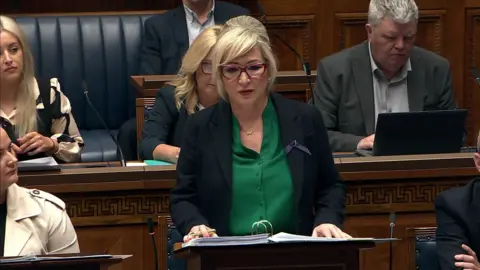MLAs clash over Supreme Court gender ruling
 BBC
BBCMembers of the Northern Ireland Assembly have clashed over the UK Supreme Court ruling that a woman is defined in law by biological sex.
The ruling was raised for debate by Democratic Unionist Party (DUP) assembly member Jonathan Buckley, who described it as a moment of "truth, clarity and common sense".
First Minister Michelle O'Neill said she has "sought advice" from officials on how the judgment may apply in Northern Ireland.
The Sinn Féin vice-president said "these are complex issues" and encouraged people to "demonstrate some compassion for the LGBTQ community".
The Supreme Court ruling has significant implications for single-sex spaces in Great Britain, such as female changing rooms and toilets.
The court had been asked to decide on the proper interpretation of the 2010 Equality Act, which applies across Great Britain but not in Northern Ireland.
Northern Ireland's Equality Commission has said it aims to publish new formal guidance in June.
Speaking in the assembly, Buckley welcomed the "unanimous, landmark ruling".
He added: "How ridiculous have things become that it took the UK Supreme Court to rule on the definition of a woman - something that the vast majority of people already knew the answer to."
The member of the legislative assembly (MLA) accused other Stormont parties of promoting a "warped and dangerous ideology" on gender issues.
O'Neill called for "sensitivity" in the debate, saying that transgender people were "feeling quite attacked right now".
"These are complex issues and we need to work our way through the outworking of the Supreme Court ruling," she said.
The Sinn Féin MLA added: "We ourselves have sought advice from our own officials.
"We await the Equality Commission's ruling and guidance because I think that will be important for everybody in terms of how we would respond to this in a wider way."

Alliance Party MLA Nuala McAllister said the court ruling "must not be used to fuel division or hostility".
"We have seen those divisive culture wars, filled with misinformation, result in real-world consequences, with hate crimes against the trans community rising in recent years across the globe," she said.
McAllister said the ruling "has not provided clarity around its real-world implications".
"Any response here in Northern Ireland should be carefully considered," she added.
Ulster Unionist Party (UUP) Doug Beattie said the trans community remained a protected group under the law.
He said the court ruling was about "privacy, safety and dignity" and "above all, it's about women's rights".
"Women wanting their own space at sport, groups, refuges, hospital wards or toilets should never be viewed as controversial," he added.
Beattie said "clear, detailed guidance" was now needed from the Equality Commission in Northern Ireland.
Social Democratic and Labour Party (SDLP) assembly member Matthew O'Toole, leader of the opposition at Stormont, said the debate had become "tragically toxic".
He said the "hard-fought rights of women" and those of the transgender community "do not have to be in competition or in opposition with one another".
"That judgment does not render invisible or meaningless the lives and experiences of trans people," he added.
He said some of the debate had "drifted into stigmatising and humiliating those people".
